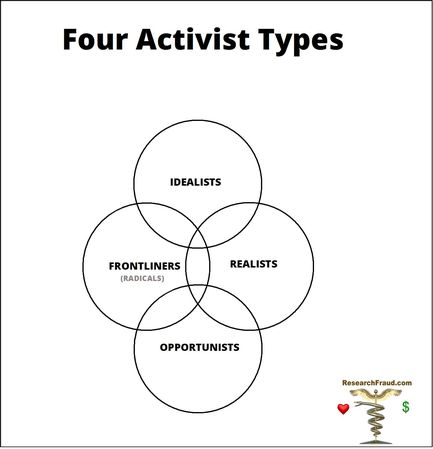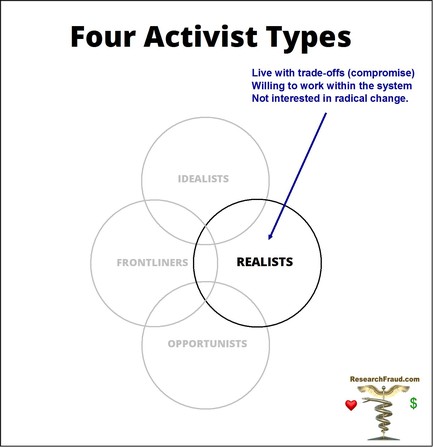RESEARCHFRAUD.COM
The Duchin Formula
How Corporations Defeat Activist Movements.
On this page
The Four Activist Types & Three Step Plan - The Duchin Formula.
The public relations industry manipulates activist movements to benefit their corporate clients. The strategy has been outlined in detail by Ronald Duchin, senior vice-president of the PR spy firm Mongoven, Biscoe and Duchin [They eventually became Stratfor.] In a landmark 1991 speech, Duchin described how Mongoven, Biscoe and Duchin works to divide and conquer activist movements. These manipulative tactics are now common among PR firms and their corporate clients.
Activists and organizations, Duchin explained, fall into four distinct categories: "idealists," "realists," "opportunists," and "frontliners". [ PR firms call frontliners "radicals” ]. That is how PR firms label activists in every movement. Then, they use a three-step plan using these four types to divide activists and defeat them. They don't have to totally defeat a movement to win. They only have to weaken it enough for them to succeed.
- Idealist
- Realist
- Opportunist
- Frontliner

The Four Activist Types Explained
The Idealist
Idealists want what is morally best for everyone. They generally fight for what is fair and just. They want to solve societies problems.
They are capable of creating change but they do have a vulnerable point, and industry puts a lot of effort into exploiting that vulnerability. Some idealists can be co-opted into believing they cannot get everything they want so they believe they must compromise to get anything at all. Compromise weakens the activist and they become easier to defeat. Many idealists are also somewhat naive on the issues so they can be manipulated more easily. Idealists often can be coerced over time to take a more "realistic" view. Getting activists to trust that industry wants to solve the problems by listening to them is an important part of the manipulation. Industry tries to turn as many idealists as they can into realists. That is the biggest part of their strategy. "Educate" idealists into becoming realists.
- Usually altruistic
- Apply an ethical and moral standard
- Generally unaware of unintended consequences
- Normally emotionally involved
- Are usually naive

The Realist
Realists are willing to live with trade-offs and are willing to compromise. They are willing to work within the system and are not interested in radical change.
For industry, the realists should receive the highest priority in any strategy. This is the most important piece of the puzzle for industry. They want to sway as many activists as they can into becoming realists. Industry can weaken activists movements by convincing them they cannot get everything they want. They might be convinced a corporation is too powerful so they may falsely think they must compromise to get what they can. They may also be manipulated into thinking they can trust industry enough to work with them. That coercion is a fundamental part of industries strategy to defeat activists. They refer to the manipulation of idealists as "educating" them into thinking like a realist. Then bargaining with them further into agreeing with industry "solutions." The only thing industry would agree with will not fundamentally solve the major issues that need to be fixed.
Realist views are often in opposition to frontline views. If industry can create enough realists then the credibility of the frontliners will be diminished.
- Willing to live with trade-offs (compromise)
- Willing to work within the system
- Not interested in radical change
- Pragmatic

The Opportunist
They are only interested in personal gain. It might be for money or attention, or to rub elbows with the rich or powerful. They would be happy to have his/her followers move in another direction if that works to his/her personal benefit. If the opportunist becomes influential they can be made to take the side of industry in the guise of making progress. Industry just has to give them the spotlight if they choose to and then the opportunist is easy to control.
- Exploit issues for their own personal agenda
- Only involved in an issue if personal gain available
- Will not sacrifice self at any price for victory on the issue

The Frontliner
This is the type of activist that scares the industry the most. Frontliners are anti-corporate, do not compromise, they fight to change the system, fight for justice, and want to fix the evils in whatever area they have chosen. Frontliners are the ones best able to truly solve the problems and they adopt the strongest methods to create real change.
- Anti-corporate
- Do not compromise
- Fight to change the system
- Fight for social justice

From Toxic Sludge is Good For You regarding frontliners ...
"They are often treated with contempt by the professional environmentalists, health advocates and other public-interest organizations ... Many times they lack organizing expertise and money. They don't have budgets or polished grant proposals needed to obtain funding from foundations and major donors. But corporations and the US government are spending tens of millions of dollars on PR and lobbying to fight these local community activists whom they derisively label "NIMBYs"-the abbreviation for "Not In My Back Yard."
...
No national environmental group is fighting the dumping of sewage sludge onto farmland, or exposing the risks inherent in the "biosolids" scam. Rural families, whose health or property has been damaged by toxic sludge, are heroes for spending their own time and money while enduring personal attacks from government and corporate PR flacks. Forget the EPA they're in bed with the sludge industry. The public interest is better served by citizen activists like Jane Beswick of Turlock, California; Jim Bynum of Laredo, Texas; and Linda Zander of Lynden, Washington.
...
Today, grassroots anti-toxic environmentalism is a far more serious threat to polluting industries than the mainstream environmental movement. Not only do local activists network, share tactics, and successfully block many dumpsites and industrial developments, they also stubbornly refuse to surrender or compromise. They simply cannot afford to."
Duchin called frontliners radicals. The derisive term “radical” represents the contempt PR firms and industry has towards this type of activist. They use it to appeal to their corporate clients. The term frontliner is a more appropriate term and we will use it in place of their radical term.
The Three Step Plan Explained

PR spy firms use a corresponding three-step strategy to deal with and defeat an activist movement:
- Step 1: Isolate the Frontliners to limit their influence. Frontliners do not compromise and do not trust industry so industry cannot change their minds.
- Step 2: Cultivate the idealists and "educate" them into becoming realists. Educate as many idealists as they can into believing they cannot get everything they want. Convince them they will need to fight for less to get anything at all. Convince them partnerships would be mutually beneficial. Educate them so they believe industry can be trusted to work with the activists. Their term "educate" really means to manipulate and lie. YOU CANNOT TRUST THEM.
They cultivate activists which means it can take time, sometimes many years to finally win. Their strategy is long term. That can make it difficult to see. - Step 3: Bargain with the realists into finally agreeing with industry. They will offer solutions or agree with solutions which don't actually solve the problems. Industry has essentially won when they have manipulated enough idealists into becoming realists. Realists fight for less, sometimes agree with industry, so are not effective in creating any meaningful change.
If industry can successfully bring about these three steps, the idealists and frontliners will be weakened and the realists can be counted on to share in the final solution. A "solution" which will not solve the problem in any meaningful way.
How Do Activists Undo The Damage?
This section is short because the Duchin Formula is all about defeating activists. It's not about undoing it.
- Do not work with opportunists
- Show the realists and idealists that their methods will not work
- Show them the frontliner views and methods are the best way to win
- Understand the Duchin Formula

The best way to fight back is founded on the PR industries own words regarding how they defeat activists. The solution is, become a frontliner by adopting their views and strategies. That is the way to win.
Summary
The four activist types as defined by the PR industry:
- Idealists want what is morally best for everyone. They generally fight for what is fair and just. They want to solve societies problems. Many are naive though and may be co-opted into becoming a realist.
- Realists compromise which weakens activist movements. They can be manipulated into agreeing with things that won't promote any real change. Industry put most of their effort into converting idealist activists into realist activists.
- Opportunists only care about themselves and are easily used by industry if industry chooses to. They can appear to be any of the other three types. The opportunist will never sacrifice themselves for the cause.
- Frontliners are anti-corporate, do not compromise, they fight to change the system, fight for justice, and want to fix the evils in whatever area they have chosen. They are the ones most able to create real solutions. Industry fears them the most. All activists should strive to be Frontline activists
And they use a three-step plan to weaken and defeat activist movements:
- Step 1: Isolate the Frontliners to limit their influence.
- Step 2: Cultivate the idealists and "educate" them into becoming realists.
- Step 3: Continue bargaining with the realists into finally agreeing with industry "solutions".
The general framework to undo their plan and move forward...
- Do not work with opportunists.
- Show the realists and idealists that their methods will not work.
- Show them the frontliner views and methods are the best way to win.
- Learn and educate others on the Duchin Formula.
Industries use the Duchin Formula to weaken and defeat activist movements. This formula may seem abstract at first, but these methods can be applied in any activist arena. Information gathered in one area can provide insight to understand their tactics elsewhere. The formula has worked very well for them. This should become common knowledge to all activists everywhere. Industry cannot manipulate activists if activists understand their tactics.
There are many parallels going on in the Chronic Fatigue Syndrome, Fibromyalgia, Gulf War Illness, Lyme, Myalgic Encephelamyalitis, Post Treatment Lyme Disease Syndrome, and medical freedom communities. They are all subjected to the same PR manipulation tactics. They have made more "progress" in weakening some activist arenas than in others. They are early in phase 2 in one arena I listed and far into phase three in another.
References
- Toxic Sludge Is Good For You
- Taking Back Your Own Backyard page 197. - Toxic Sludge Is Good for You: Lies, Damn Lies and the Public Relations Industry
- Divide and conquer page 65. - Toxic Sludge Is Good for You: Lies, Damn Lies and the Public Relations Industry
- Take An Activist Apart and What Do You Have? And how do you deal with him/her.
- Stratfor Monitors and Studies Social Movements
- How To Win The Media War Against Grassroots Activists: Stratfor’s Strategies